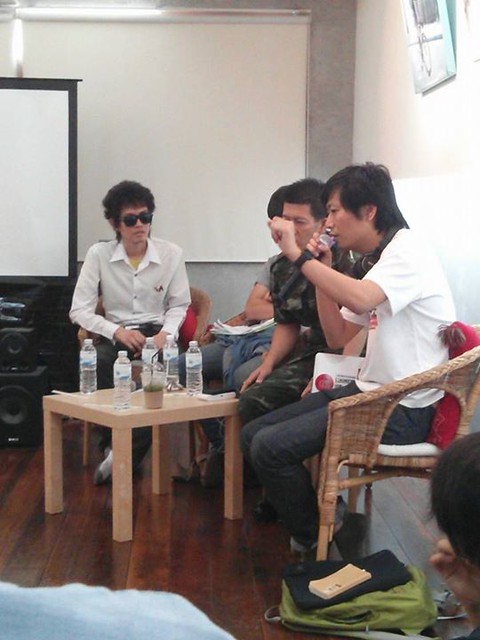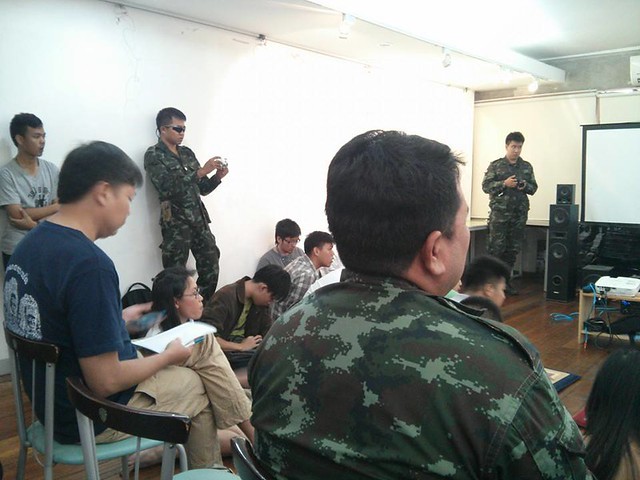More than 20,000 people have signed a petition urging the junta not to pass a set of digital economy bills which will give the state unprecedented powers of mass surveillance and control over communications in the name of national security. Meanwhile, military officers interrupted a seminar on the bill, admitting that the bill is aimed at controlling people’s thoughts.
It took about a month for Thai Netizen Network (TNN), an advocacy group promoting online privacy and internet freedom, to collect 20,828 names against the bill on the online petition platform change.org. It gained 10,000 names within the first week.
Meanwhile, TNN plans to submit an open letter on Tuesday to the Constitution Drafting Committee and the National Legislative Assembly (NLA), urging them to halt the legislative process of the digital economy bills, which were approved by the junta cabinet in early January.
In a related development, four military officers arrived uninvited at a seminar on the bill, organized by TNN on Sunday. According to The Nation, the soldiers came in an armoured Humvee and "asked" to be allowed to defend the draft bills.
Army Lieutenant Kittiphob Tiensiriwong urged the participants to accept the bills, saying that the NLA had good intentions.
He said the bills aimed "to control those who think unlike others - those who have their own mind and are not considering the thinking of the collective," quoted by The Nation.
The Thai Netizen made the following remarks on the digital economy bills:
-
These bills in fact are not about the digital economy, but national security, and bestow vast powers on the authorities.
-
These bills, which will extensively affect people’s lives and the economy, have not been adequately deliberated by either the people or the state authorities. In particular, the eight bills which were hastily proposed and approved by the cabinet on 6 January 2015 were not on the meeting agenda. Some state agencies have never seen the bills before.
-
There are at least five draft amendments and brand new bills – the amendment of Computer Crime Act, the Cyber Security, Digital Transactions and Inducement Suppression bills, and the amendment of Criminal Procedure bill – which allow the authorities to search, confiscate, have access to and intercept communications without any check and balance from any credible judicial authority and in some cases, these acts can be conducted without strong evidence. This is a violation of freedom of expression, the right to privacy and the right to personal information, and will affect the confidence of the operators of businesses related to information and communication.
-
The draft amendment of the National Broadcasting and Telecommunication Technology (NBTC) bill destroys the independence of this regulator and may pave the way for the return of radio frequencies into the hands of the government and the military, as was the case before the enactment of 1997 Constitution. This will destroy the principle that radio frequencies are public resources and will also destroy the mechanism of the free market. The objectives of the fund which now derives from the license fee for radio frequencies will be gravely modified. From a fund for research for the public good – promoting consumer protection, social enterprise, professional ethics, accessibility, and media literacy for people with physical challenges, the elderly and the marginalized – it will become a fund for loans to state authorities and the private sector.
-
The draft amendment of the NBTC does not tackle the problems of transparency and accountability. The bill will establish another agency which has a rather similar financial and administrative structure.
-
All the bills lack a clear mechanism to protect the rights and liberties of consumers. Moreover, no committee has a quota for representatives on rights. The most obvious case is the committee on the protection of personal information under the Protection of Personal Information bill. The three seats for consumer rights representatives were cut and replaced with two seats for national security representatives. They also share a secretariat with the committee on National Cyber Security. The two agencies’ roles are in conflict. This may lead to conflict of interest and a poor check and balance mechanism.


Prachatai English is an independent, non-profit news outlet committed to covering underreported issues in Thailand, especially about democratization and human rights, despite pressure from the authorities. Your support will ensure that we stay a professional media source and be able to meet the challenges and deliver in-depth reporting.
• Simple steps to support Prachatai English
1. Bank transfer to account “โครงการหนังสือพิมพ์อินเทอร์เน็ต ประชาไท” or “Prachatai Online Newspaper” 091-0-21689-4, Krungthai Bank
2. Or, Transfer money via Paypal, to e-mail address: [email protected], please leave a comment on the transaction as “For Prachatai English”
